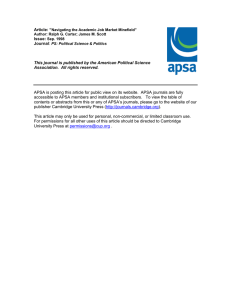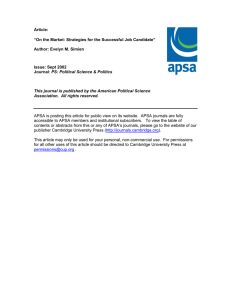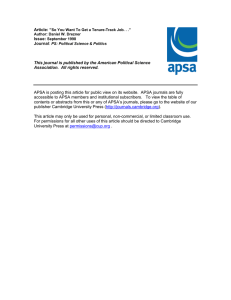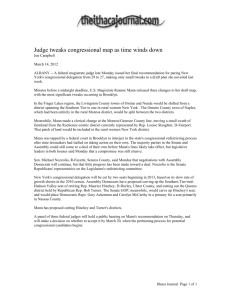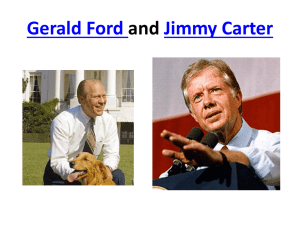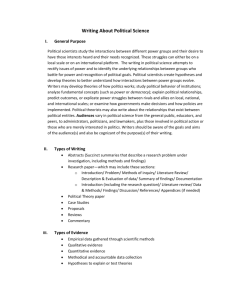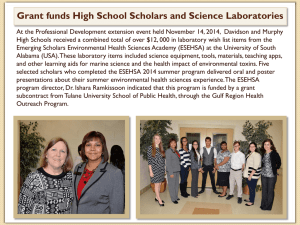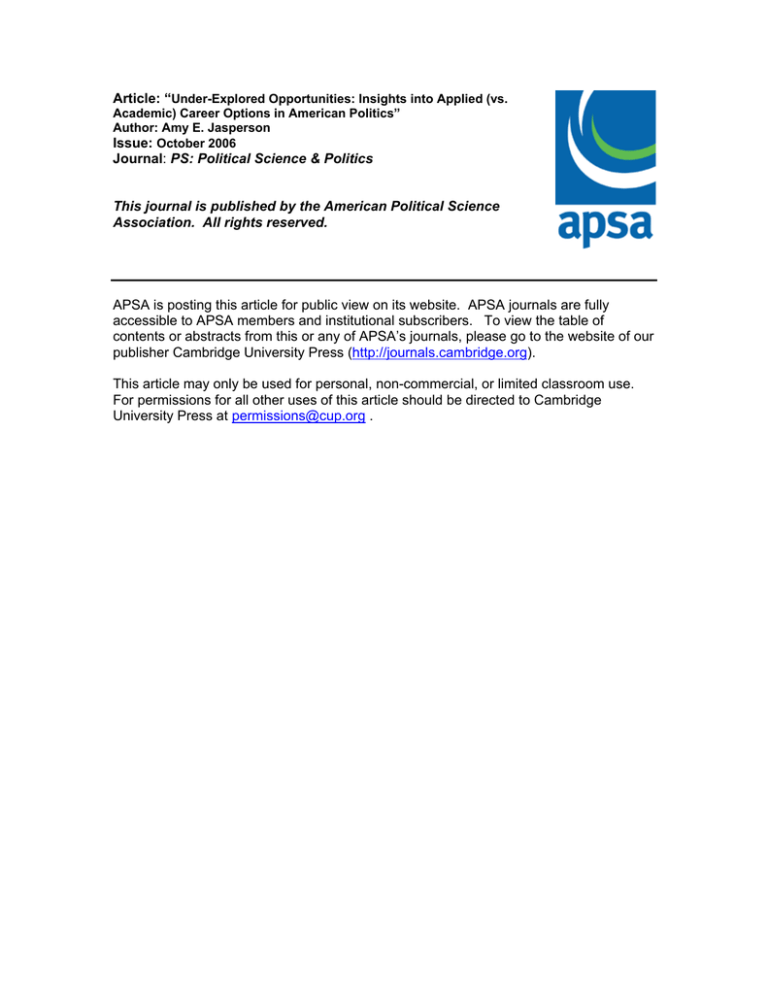
Article: “Under-Explored Opportunities: Insights into Applied (vs.
Academic) Career Options in American Politics”
Author: Amy E. Jasperson
Issue: October 2006
Journal: PS: Political Science & Politics
This journal is published by the American Political Science
Association. All rights reserved.
APSA is posting this article for public view on its website. APSA journals are fully
accessible to APSA members and institutional subscribers. To view the table of
contents or abstracts from this or any of APSA’s journals, please go to the website of our
publisher Cambridge University Press (http://journals.cambridge.org).
This article may only be used for personal, non-commercial, or limited classroom use.
For permissions for all other uses of this article should be directed to Cambridge
University Press at permissions@cup.org .
Under-Explored Opportunities: Insights
into Applied (vs. Academic) Career
Options in American Politics
Amy E. Jasperson, University of Texas at San Antonio
A
great divide between “Ivory Tower”
academics and those engaged in
applied politics characterizes popular
perceptions for those on both sides of
this chasm. Yet, after spending a year in
Washington, D.C., as part of the APSA’s
Congressional Fellowship Program, it is
evident that there are commonalities as
well as differences between these two
groups. However, applied career opportunities are rarely investigated by graduate
students in political science, who aim
instead for a tenured position in academe.
According to the most recent data collected by the APSA, only 7 to 13% of Ph.D.s
selected a non-academic position or career
track during the period from 1990 through
2000, and this trend remained stable during the early part of this decade (Lopez
2003, 836).
This article contributes further insight
on this subject by surveying a group of
political science Ph.D.s who blazed trails
in the area of American political institutions and behavior in Washington, D.C., in
jobs outside of academe, thus straddling
the perceived disconnect between the two
worlds. Their insights identify interesting
contexts in which political science training is being applied to current practical
problems and the ways that these contexts
require adaptability. They raise useful and
important considerations for academics
weighing a range of options at a variety of
points in their careers.
Similar Skill Sets
Most of these scholars agree that their
political science training provided subject
matter expertise that initially gave them
a strong advantage over those without
similar education. This education, when
combined with practical experience as
CFP Fellows, provided what they believe
Amy E. Jasperson is associate
professor of political science at the University of Texas, San Antonio. She was
a 2005–2006 APSA Congressional
Fellow, serving in the office of Senator
Bill Nelson (D-FL).
952
was a leg up on their competition. In
some cases, dissertation expertise established credibility that opened the door
to opportunities. Beth Fuchs, a principal
at Health Policy Alternatives, a health
policy consulting firm, initially worked
for the Congressional Research Service
(CRS) as a social legislation specialist
focusing on health care after completing her dissertation on health policy.
After establishing his expertise through
a well-received dissertation on congressional elections, Thomas Mann teamed
up with Norm Ornstein to persuade the
American Enterprise Institute to allow
them to direct the Congress Project (one
of many collaborations), designed to use
academic scholarship to improve public
understanding of Congress (Mann 2002).
Stan Bach’s general expertise in American government and Congress helped
him to obtain his first position at CRS.
From 1972 to 2002, he continued to hone
his expertise in congressional rules and
procedure and became an invaluable asset
as a senior specialist, assisting members
of Congress and their staffs with a range
of research questions, including providing
them with information relevant to crafting
their strategies and tactics.
In addition, these scholars indicate that
graduate education cultivates agility in
thinking deeply about research problems.
Ph.D.s are trained to reason abstractly, to
generate research questions, and to perform original data collection and analysis.
The ability to analyze information and to
communicate effectively in writing are
common skills that applied positions require. Such training has proven useful in a
variety of applied contexts. As a member
of Congress first elected in 2004, Dan
Lipinski found that his data analysis background helped him sift through statistical
presentations from interest groups advocating different policy positions. After
establishing traditional academic careers,
Neil Pinney at the Government Accountability Office (GAO) and Scott Keeter at
the Pew Research Center utilized their
specialized methodological training
initially established through their graduate
research interests in economic analysis
and survey research, respectively, to move
into their current applied positions.
Teaching skills are other assets valued
in a range of applied positions. Presentation skills are central to work at CRS, the
Government Affairs Institute (GAI) at
Georgetown University, and the Washington Center for Internships and Academic
Seminars, among other institutions. In
these positions, political science Ph.D.s
conduct seminars and short courses for a
variety of audiences, including members
of Congress and congressional staffers,
federal bureaucrats, and undergraduate
students outside of their home institutions
on topics in American government and
politics.
Contrasting Contexts
The faster pace, client-determined research agendas, and different target audiences in applied settings require political
science Ph.D.s to adapt the skills above to
the unique qualities of each environment.
Responding to changing circumstances in
a rapid manner characterizes the work of
Ph.D.s on the Hill. George Kundanis, currently serving as a senior advisor to House
Minority Leader Nancy Pelosi (D-CA)
after having served in Democratic Party
leadership since the 1970s, characterizes
the Hill environment as one of “thinking deeply for a short period of time.”
Similarly, Bill Koetzle, assistant to House
Speaker J. Dennis Hastert (R-IL) for policy, highlights the ability to research and
think systematically about complex ideas,
but also emphasizes the ability to multitask, to be adaptable to changing tides
and emerging events, and to think quickly
on one’s feet. Further, both Hill staffers
mention the primary importance of working within the party structure, creating
a much different operating context than
academic analysis. CRS specialists maintain objectivity but are also called upon
to meet the rapid-response deadlines for
requests made by Congress. Neil Pinney
at GAO notes that this neutral oversight
agency has more time to produce reports
than CRS, and adds that most projects in
applied settings require answers to narrow
PS October 2006
questions generally defined by a congressional client. These constraints provide a
direct contrast to an academic’s ability to
determine her own research agenda and
focus on generating larger order theories
over longer periods of time.
Industry constraints and non-academic
audiences affect the nature of output
produced in applied contexts. Due to time
constraints, one-page memos are the standard output on the Hill while four-page
executive summaries are the acceptable
length for other applied work. At the Pew
Research Center, studies target a wider
audience than academic scholarship,
requiring the ability to think and summarize sophisticated research in writing
that can be understood by the educated
lay public. Contextual differences also
affect the teaching that occurs in applied
settings. While work at GAI, TWC, CRS,
and other educational entities involves
structuring curriculum, creating lectures,
and making presentations, John Haskell
at GAI notes that it is a different task,
relative to university teaching, to produce
and deliver a short course that is subjected
to market forces and the satisfaction of
professional adult audiences.
Larger Benefits and Costs
addition, some who left tenured academic
positions assumed risk to stability when
they gave up the job security of tenure.
Bridging the Divide
Overall, those surveyed highlight
a number of advantages to serving as
political scientists in applied settings in
Washington, D.C. These scholars are
able to learn about new topics, to address
real world problems on a daily basis, and
believe they have a direct impact on shaping elite opinion and policy outcomes.
Several scholars mentioned the access to
data and intellectual support provided in
the context of their applied positions that,
as one scholar noted, is greater than any
university in the country. However, they
observe that these benefits also come with
costs. Many miss the flexible schedule and the autonomy to set their own
research agenda. Some on the Hill miss
the intellectual culture of the university. In
Notably, many scholars lamented the
lack of ability to move freely between the
two worlds. Scholars such as Ornstein
and Mann have succeeded in bridging
the gap, following Mann’s argument that
scholarship and applied work are “complementary, even synergistic, not mutually exclusive career alternatives” (Mann
2002). Reflecting this point, all scholars
surveyed valued practical experience outside of the university setting, such as the
CFP, designed to enhance teaching and
scholarship and to provide a new perspective. Perhaps with more opportunities to
experience real-world politics, academics
will make further headway in bridging the
gaps and strengthening the commonalities that exist between the academic and
practical worlds.
Haskell, Scott Keeter, Bill Koetzle, George Kundanis, Celinda Lake, Congressman Dan Lipinski,
Thomas Mann, Norm Ornstein, Neil Pinney, John
Ratliff, and Ben Scott for their contributions and
insights. Those included in this study are not
intended to be an exhaustive or representative list
of political science Ph.D.s working in applied
settings.
Note
1. The author would like to thank Jeff Biggs,
director of the Congressional Fellowship Program,
and Michael Brintnall of the American Political
Science Association. She also thanks Gene Alpert,
Stan Bach, Arthur Burris, Beth Fuchs, John
References
Lopez, Linda. 2003. “Placement Report: Political
Science Ph.D.s and ABDs on the Job Market
in 2001–2002.” PS: Political Science and
Politics 36 (October): 835–41.
Mann, Thomas E. 2002. “A Foot in Both Camps:
Building a Career in Washington and Aca-
PSOnline www.apsanet.org
deme.” In Policy Passages: Career Options for
Policy Wonks, ed. Howard J. Wiarda. Praeger.
953

